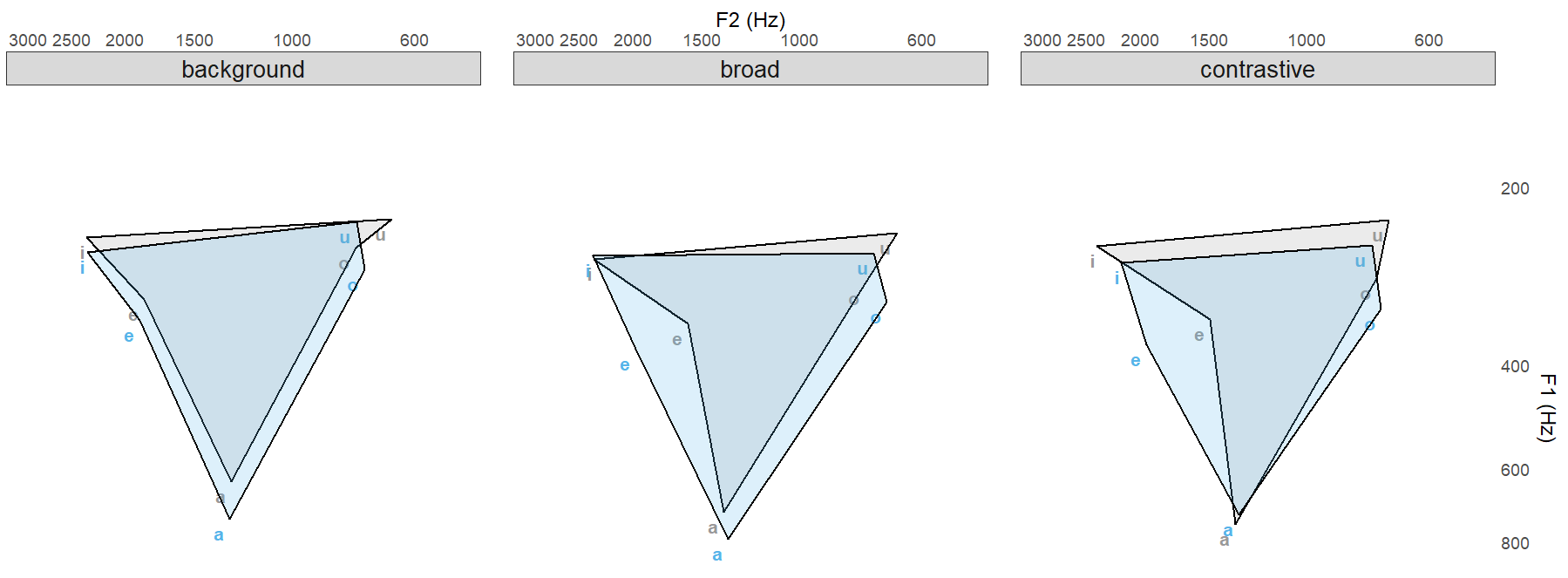Objective: This study investigates the influence of levodopa (L-dopa) on tongue body movements during speaking.
Background: Parkinson’s disease (PD) is a neurodegenerative disorder affecting non-motor and motor functions. Gross motor symptoms are manifested in smaller, slower and less extended movements. Speech is also affected due to slower and unprecise movements of the articulators as well as a reduced vowel space [1, 2]. Whereas it is proven that L-dopa is an effective treatment for gross motor performance [3], it remains unclear to what extent it influences speech production.
Method: 15 native German speaking patients with idiopathic PD were recorded with an Electromagnetic Articulograph in two conditions: (1) without drug intake (med-OFF, 12 hours cessation of PD medication) and (2) with drug intake (med-ON, 200mg of soluble L-dopa). The speech task elicits words in accented (broad, contrastive focus) and unaccented syllables (background) requiring different degrees of articulatory effort. The disyllabic target words consisted of 5 vowels for V1 (/i, e, a, o, u/). To capture tongue body movements i) gestural duration, ii) displacement and iii) peak velocity were calculated [4]. Moreover, the vowel articulation index (VAI) [5] was calculated. Patients’ motor impairment was evaluated using the ‘Unified Parkinson’s Disease Rating Scale’ (UPDRS III; [6]) in med-OFF and med-ON condition. From the test scores we calculated the L-dopa response as percentages of motor improvement from OFF to ON condition.
Results: Preliminary results from six patients show that all patients responded well to the L-dopa intake (table1). Moreover, L-dopa had an influence on tongue body movements resulting in i) shorter durations, ii) larger displacements and iii) faster peak velocities of the vocalic gesture in every focus condition. The overall vowel space in which the tongue body moves is plotted in figure 1. It gets more pentagonal in med-ON (blue area) compared to the more triangular vowel space in med-OFF (grey area). The VAI indicates that the vowel space is reduced or centralized in background and contrastive focus but increases in broad condition from OFF to ON.
[table1]
[figure1]
Conclusion: Levodopa has an influence on speech performance by producing syllables more efficiently and precisely in med-ON condition. Tongue body movements are longer, larger and faster in med-ON and the vowel space is less reduced.
References: [1] Duffy, J. R. (2013). Motor Speech disorders-E-Book: Substrates, differential diagnosis, and management. Elsevier Health Sciences. [2] Thies, T., et al. (2020). Prominence marking in parkinsonian speech and its correlation with motor performance and cognitive abilities. Neuropsychologia, 137(3),107306. [3] Katzenschlager, R., & Lees, A. J. (2002). Treatment of Parkinson’s disease: levodopa as the first choice. Journal of neurology, 249(2), ii19-ii24. [4] Browman, C. P. & Goldstein, L. (1986). Towards an articulatory phonology. Phonology, 3(1), 219-252. [5] Sapir, S., et al. (2011). Acoustic metrics of vowel articulation in Parkinson’s disease: vowel space area (VSA) vs. vowel articulation index (VAI). In: Models and Analysis of Vocal Emissions for Biomedical Applications. Firenze University Press, 173–175. [6] Goetz, C. G., & the Movement Disorder Society Task Force on Rating Scales for Parkinson’s Disease (2008). Movement Disorder Society-sponsored revision of the Unified Parkinson’s Disease Rating Scale: Scale presentation and clinimetric testing results. Movement Disorders, 22, 2129–2170.
To cite this abstract in AMA style:
T. Thies, D. Mücke, R. Dano, M.. Barbe. Levodopa induced changes of tongue body movements during speech production [abstract]. Mov Disord. 2020; 35 (suppl 1). https://www.mdsabstracts.org/abstract/levodopa-induced-changes-of-tongue-body-movements-during-speech-production/. Accessed October 22, 2025.« Back to MDS Virtual Congress 2020
MDS Abstracts - https://www.mdsabstracts.org/abstract/levodopa-induced-changes-of-tongue-body-movements-during-speech-production/


